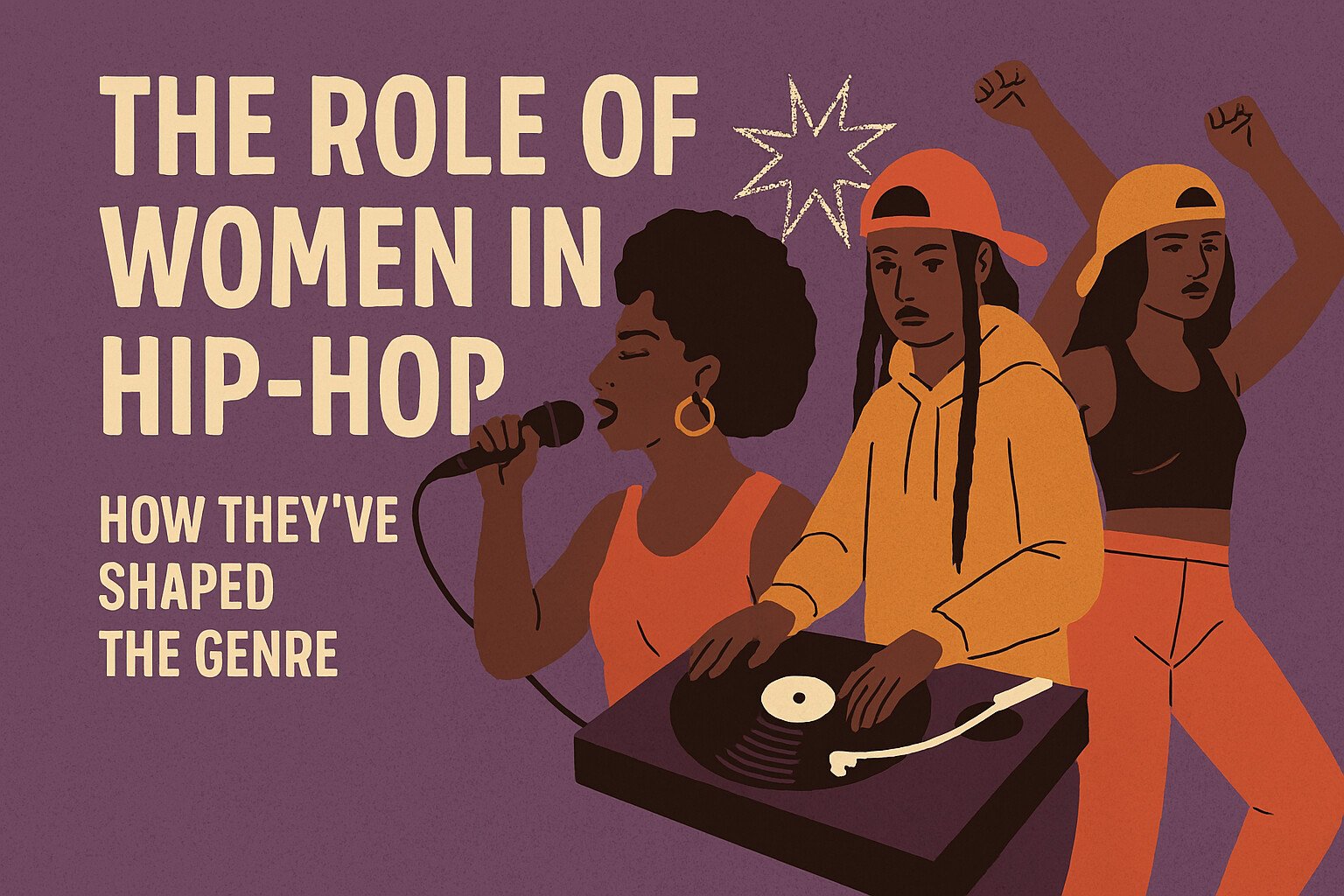
Hip-hop is more than just a genre of music; it’s a cultural movement that has reshaped the landscape of global entertainment, fashion, and politics. From its beginnings in the 1970s Bronx to its modern-day domination of the charts, hip-hop has told stories, influenced change, and set trends. Yet, when people think of hip-hop history, male names like Tupac, Biggie, and Jay-Z often come to mind. But here’s the thing: women have been there from the start, driving the culture forward, breaking boundaries, and paving their own paths in a space that hasn’t always welcomed them with open arms.
This article dives deep into the often overlooked but undeniable impact that women have had in hip-hop. From MCs and producers to dancers and moguls, women have played a vital role in shaping this genre. Let’s celebrate these trailblazers, their influence, and how they continue to change the game.
Early Days: The Foundation of Hip-Hop
When hip-hop first emerged in the Bronx in the late 1970s, it was a male-dominated space. Block parties, rap battles, and breakdancing competitions were the heart of the movement, and women weren’t always front and center. But they were there, often working behind the scenes or as part of larger crews.
MC Sha-Rock is widely recognized as the first female rapper, joining the legendary group the Funky 4 + 1. She was often referred to as the “Mother of the Mic” because of her incredible flow and stage presence. Sha-Rock set the foundation for future generations of female MCs, proving that women had a place in hip-hop, not just as dancers or background singers, but as legitimate voices on the mic.
By the 1980s, more women began to rise in the hip-hop scene. Roxanne Shanté, part of the Juice Crew, burst onto the scene at just 14 years old with her track “Roxanne’s Revenge,” a diss track that sparked one of the first major beefs in hip-hop history—the infamous “Roxanne Wars.” Shanté’s ability to stand toe-to-toe with male MCs showed that women could hold their own in the rough-and-tumble world of battle rap.
Breaking Barriers: The 1990s and the Rise of Women in Hip-Hop
The 1990s were a transformative decade for women in hip-hop. Female rappers were not only breaking into the mainstream but also reshaping the narratives around femininity, strength, and sexuality in the genre.
Queen Latifah was one of the first female rappers to gain widespread recognition, and she did so with a strong message of empowerment. Her 1993 hit, “U.N.I.T.Y.,” addressed issues of sexism, harassment, and violence against women, themes that were often ignored in a genre that sometimes glorified hypermasculinity and misogyny. Latifah demanded respect for women in the industry, both on and off the mic, setting a precedent for future female artists to speak up about the challenges they faced.
Then came MC Lyte, another game-changing artist who opened doors for future female rappers. Known for her distinctive voice and sharp lyrics, Lyte became the first solo female rapper to release a full album, Lyte as a Rock, in 1988. Her influence extended beyond just music—Lyte became a role model for many women in hip-hop, proving that you didn’t have to conform to male expectations to succeed.
And we can’t talk about this era without mentioning Salt-N-Pepa. This trio of women brought sass, sex appeal, and street smarts to hip-hop, helping it reach mainstream audiences. Their anthem “Push It” became a massive hit and broke down barriers, showing that women could talk about desire and power in a genre where men usually dominated the conversation.
Women in Production and Behind the Scenes
While female rappers were gaining attention in the ‘80s and ‘90s, women were also making moves behind the scenes as producers, managers, and executives. One name that stands out is Sylvia Robinson, often credited as “The Mother of Hip-Hop.” She founded Sugar Hill Records and produced the first-ever commercially successful rap single, “Rapper’s Delight” by the Sugarhill Gang. Robinson’s influence extended far beyond production—she was a businesswoman who understood the cultural impact of hip-hop long before many others.
In more recent years, producers like WondaGurl have shown that women can take control of the sound of hip-hop. WondaGurl, a Canadian producer, has worked with artists like Travis Scott, Drake, and Jay-Z, proving that women can hold their own in the male-dominated world of beat-making and production.
The 2000s and the Age of Female Empowerment
The 2000s saw the rise of more female MCs who not only rapped but also created full-on brands around their personalities. Missy Elliott is a prime example. With her futuristic beats, quirky music videos, and unapologetic lyrics, Missy became one of the most influential artists of the 2000s. Tracks like “Work It” and “Get Ur Freak On” dominated the charts, and Missy’s fearless approach to music and fashion made her a trailblazer for the next generation.
Nicki Minaj, who burst onto the scene in the late 2000s, took Missy’s blueprint and expanded it. With her outrageous persona, rapid-fire flow, and fierce lyricism, Nicki changed the game for female rappers. She wasn’t just competing with other women—she was going head-to-head with male rappers and coming out on top. Her debut album, Pink Friday, went triple platinum, and she’s been a chart-topper ever since, becoming one of the most commercially successful female rappers of all time.
Nicki also redefined what it meant to be a woman in hip-hop. She embraced her sexuality, flaunted her unique style, and refused to fit into a mold. Her alter egos, theatrical performances, and over-the-top visuals made her a standout, not just in hip-hop but in pop culture as a whole.
Today’s Powerhouses: Women at the Forefront of Hip-Hop
Fast forward to today, and women in hip-hop are no longer the exception—they’re leading the pack. Artists like Cardi B, Megan Thee Stallion, and Doja Cat have taken the music industry by storm, showing that women aren’t just participants in hip-hop—they’re the driving force.
Cardi B, with her raw lyrics and larger-than-life personality, became the first female rapper in 19 years to top the Billboard Hot 100 with a solo track when “Bodak Yellow” blew up in 2017. Her success story is a true rags-to-riches narrative, resonating with fans who see her as a symbol of determination and self-made success.
Megan Thee Stallion is another artist who has cemented her place in hip-hop history. Her viral hit “Hot Girl Summer” became more than just a song—it was a movement. Megan’s confidence, lyrical prowess, and unapologetic approach to her sexuality have earned her widespread acclaim. She’s a champion for women’s empowerment, using her platform to speak out on issues like body positivity and gender inequality.
Meanwhile, Doja Cat has been pushing the boundaries of genre with her unique blend of rap, pop, and R&B. Her playful approach to music and visuals has made her a favorite on platforms like TikTok, where her tracks often go viral.
The Future of Women in Hip-Hop
As we look to the future, it’s clear that women in hip-hop are here to stay. From the days of MC Sha-Rock and Roxanne Shanté to the chart-topping hits of Nicki Minaj, Cardi B, and Megan Thee Stallion, women have continually shaped the direction of the genre. And now, with the rise of more independent artists and the democratization of music through platforms like SoundCloud, YouTube, and TikTok, the door is wide open for the next generation of female artists to take the reins.
While there’s no denying that challenges still exist—whether it’s sexism, colorism, or the pressure to conform to industry standards—today’s female artists are more empowered than ever. They’re not just making music; they’re building empires, changing narratives, and demanding respect in a genre that once marginalized them.
Conclusion: Women’s Unstoppable Influence on Hip-Hop
Women have always been an integral part of hip-hop, even when their contributions were overlooked or minimized. From the early days of MC Sha-Rock to today’s superstars like Megan Thee Stallion and Cardi B, women have continually broken barriers, pushed boundaries, and reshaped the genre.
Hip-hop is a constantly evolving art form, and women have been, and always will be, at the forefront of its progression. As more and more female voices rise to the top, one thing is certain: the future of hip-hop will be written by women as much as men, and their influence will continue to be unstoppable.
So, next time you vibe to your favorite track, remember the women who paved the way and those who are making waves today. Hip-hop wouldn’t be the same without them.


